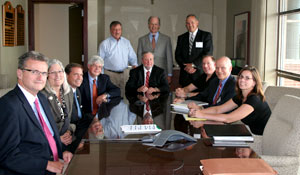
Fiscal Year 2011 Executive Committee members (Terms begin July 1)
State Bar FY 11 officers and division representatives with newly elected members to Executive Committee (seated from left): President-elect Jim Brennan, Milwaukee; Margaret Wrenn-Hickey, Milwaukee; President Jim Boll, Madison; GLD representative Mike Kernats, Madison; Past President Doug Kammer, Portage; NRLD representative Gordon Kirsten, Wichita, Kan.; Charles Hanson, La Crosse; and Kelly Nickel, Milwaukee. Standing from left: Paul Swanson, Oshkosh; William Curran, Mauston; and Kevin Klein, Phillips. Not pictured Senior and Young lawyers division representatives.
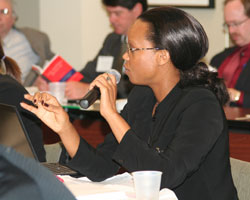
Lynnette McNeely, Milwaukee, weighs in on mandatory/voluntary bar discussion during board meeting.
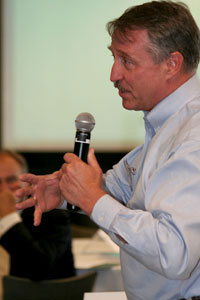
Governor Paul Swanson of Oshkosh urges the board to move the mandatory bar issue to the supreme court.
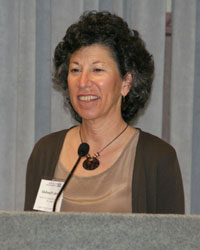
Governor Marsha Mansfield explains the Public Interest Law Section's opposition to Milwaukee County's proposed ordinance.
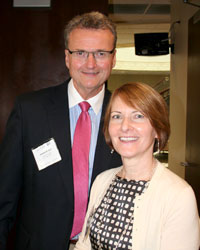
Outgoing Board of Governors chair, Jim Brennan of Milwaukee, welcomes Incoming Board of Governors chair, Sue Collins of Madison.
July 7, 2010 – The State Bar's Board of Governors rejected a draft petition that would have sent the bar membership status debate to the Wisconsin Supreme Court, but acted unanimously to oppose a county ordinance that would limit the county's exposure to litigation and took a clear stance with regard to two federal amicus briefs.
Of the 42 governors that attended the State Bar's June 25 board meeting, a majority (25) voted to adopt a petition asking the supreme court to review its membership structure as a mandatory (integrated) bar. But a 60 percent supermajority was required to pass the motion. Thus, it failed by one vote.
Governors debated the sufficiency and quality of the two-page petition, drafted by the Strategic Planning Committee (SPC), considering the importance of the issue. Others implored the board to pass the motion and let the supreme court decide based on briefs and other testimony.
While the board continued to disagree on the issues concerning bar membership status, it was fully unified in other important actions of the day.
Membership status petition fails
The vote followed a discussion of the two-page petition that focused, in large part, on the specific approach taken by the SPC in response to a resolution adopted by the board at its May 5 meeting.
That May 5 resolution affirmed the board's intent "that the Wisconsin Supreme Court be asked to review the status of the integrated bar" and authorized the SPC to draft two or more supreme court petitions "requesting that it review the status of the integrated bar and whether it should be modified or made voluntary."
Several governors, including governors Nathaniel Cade, Donna Jones, and Margaret Hickey, argued that the single petition developed by the SPC failed to meet that directive.
SPC Chair John Macy noted the intent to preserve neutrality on the central issues that would be before the court with restricted time limitations to draft multiple petitions. Macy and other supporters of the SPC petition stressed that all relevant perspectives on the issue could be brought to the court via briefs from the interested parties.
SPC members and other governors also pointed to the extensive documentation of relevant issues and State Bar member perspectives encompassed within the Future of the State Bar: Mandatory/Voluntary Membership Reportprepared by the committee and previously accepted by the Board, along with other material compiled by the SPC (available atwww.wisbar.org/stratplancomm).
Several board members, including immediate Past President Diane Diel, objected to a provision included in the petition asking the court to "consider redefining the purpose of the State Bar of Wisconsin as enunciated in SCR 10.02." She argued that this language went beyond the authorization given to the SPC by the board on May 5.
Outgoing President Doug Kammer and others argued that the goal of the draft petition was to move the mandatory/voluntary bar issue away from the board and to the supreme court, which has ultimate jurisdiction over the matter.
SPC member Nick Zales cautioned his colleagues that thousands of State Bar members will respond negatively if the board fails to get the matter in front of the court. He and others also stressed the need for the board to focus on other important issues.
In the end, those opposed took the vote. At this time, it is not clear whether the issue will be revived.
Stance against Milwaukee County proposed ordinance
In response to a request for comment, the board voted to oppose a proposed amendment to ch. 56.30(6) of the Milwaukee County Code of General Ordinances to "require that all contracts executed by Milwaukee County prohibit the contractor from undertaking class actions against Milwaukee County on any matter other than enforcement of the subject contract."
The amendment would disallow entities like the Legal Aid Society from suing the county in situations where the county has contracted for services with the entity.
Such was the situation in Christenson v. Sullivan, 96-CV-1835, a case in which the Legal Aid Society of Milwaukee filed a class action suit on behalf of prisoners in a Milwaukee County Criminal Justice facility for overcrowding and unsanitary living conditions.
Governor Margaret Hickey warned against "restricting litigants' rights" and governor Marsha Mansfield noted that the State Bar's Public Interest Law Section actively opposes the proposal.
Thomas Cannon, executive director of the Legal Aid Society, attended the meeting and said Milwaukee County is "trying to restrict the remedies available to poor and vulnerable people" and said a third-party payor "does not have a right to dictate the scope of representation."
Approval of amicus briefs
Recently, the Seventh Circuit Court of Appeals decided Siefert v. Alexander, No. 09-1713, holding that a Wisconsin judge or judicial candidate may announce political party membership, but cannot endorse partisan candidates or personally solicit campaign contributions.
The suit was filed by Milwaukee County Circuit Court Judge John Siefert, who invoked free speech rights in challenging Wisconsin's Judicial Code of Conduct for prohibiting all three activities.
In the event that a motion for rehearing en banc is filed, the board authorized the State Bar to file an amicus supporting an independent judiciary and the regulations established by the Wisconsin Judicial Commission. It is not yet clear whether a motion will be filed.
The board also voted unanimously to sign an amicus brief developed by the New York State Bar Association in the American Bar Association's suit against the Federal Trade Commission concerning the Fair and Accurate Credit Transactions Act (FACTA).
Under FACTA, the "Red Flags Rule" requires "creditors" to develop and implement written identity theft prevention programs. The ABA filed suit to block application of the rule to the legal profession. In October 2009, a federal court ruled that applying the rule to lawyers was unreasonable. In February 2010, the FTC filed a notice of appeal.
Other actions:
Approves funding for Access to Justice Commission. By unanimous vote, the board approved a grant of $27,596 to the Wisconsin Access to Justice Commission from the State Bar’s Access to Justice Reserve. The grant will allow the commission to meet, develop its future plans, and conduct education and outreach with other stakeholders in the civil justice system.
Presents “Scales of Justice” awards to state legislators. The State Bar’s Legislative Oversight Committee presented the “Scales of Justice” award to five Wisconsin State Legislators – Sens. Lena Taylor (D) and Jim Sullivan (D), Reps. Gary Hebl (D), Fred Kessler (D), and Bill Kramer (R) – whose assistance was particularly beneficial to the State Bar during the last legislative session.
Approves annual budget for FY 2011. The Board unanimously approved the proposed State Bar operating budget for fiscal year 2011, providing for $11.5 million in spending with no dues increase. Finance Committee Chair Nick Zales noted that the proposed budget will provide sufficient funding for all current and new programs and “maintains the Bar’s ability to meet its strategic goals.”
Elects Executive Committee members for FY 2011. Pursuant to Wisconsin Supreme Court Rule 10.06, the Board elected six new governors to the State Bar’s Executive Committee for fiscal year 2011. Those governors are: William Curran, Mauston; Charles Hanson, LaCrosse; Margaret Hickey, Milwaukee; Kevin Klein, Phillips; Kelly Nickel, Delavan; and Paul Swanson, Oshkosh.
Approves Collins as new Board chairperson. The Board voted unanimously to appoint Susan Collins as the State Bar’s Chairperson of the Board of Governors for fiscal year 2011. Collins, who serves as trust counsel for Marshall & Ilsey Trust Co., N.A. in Madison, will replace president-elect James Brennan. Kevin Palmersheim, member of the Board’s Nomination Committee, said Collins has the distinct “ability to build consensus” and direct governors to what is important.
Approves appointments to the Wisconsin Trust Account Foundation. The Board approved outgoing State Bar president Doug Kammer’s four appointees to the 15-member Wisconsin Trust Account Foundation Board. Those appointees are attorneys Lee Atterbury, Sarah Fry Bruch, Nick Zales, and non-attorney Robert Wachuta, a vice president at Community Bank of Portage.
